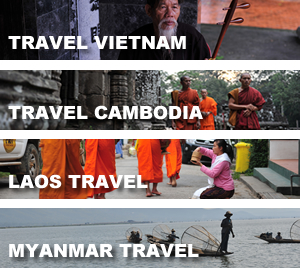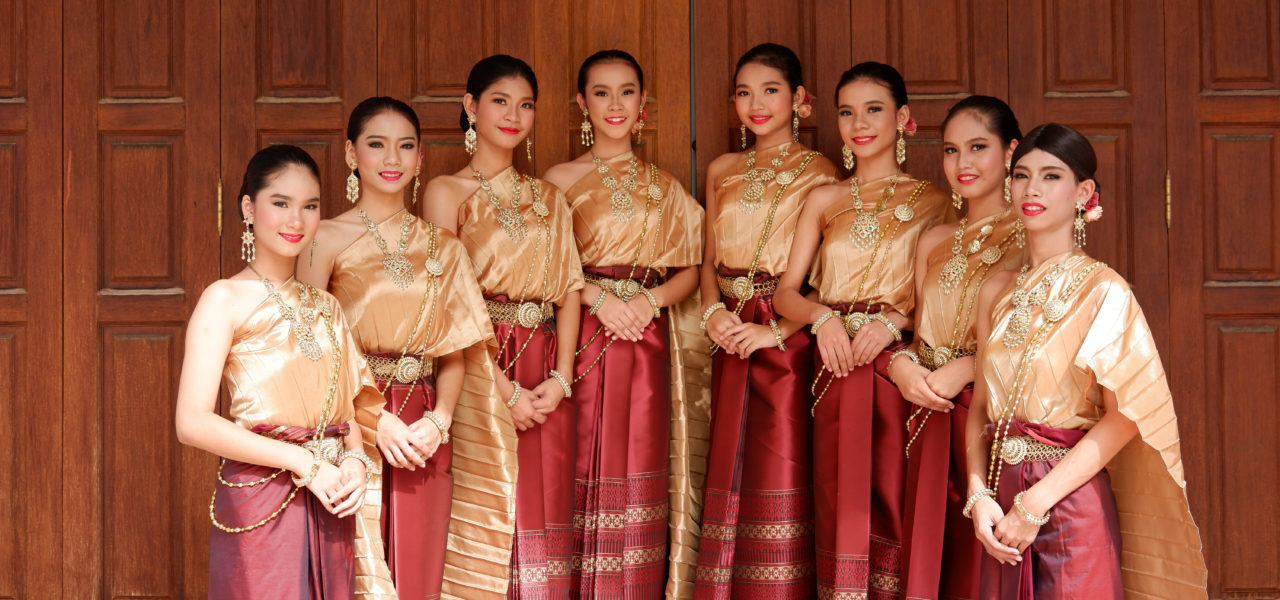
Thailand is a country with a rich and diverse culture that attracts millions of visitors every year. The culture in Thailand is a mix of strong Indian influences, Chinese traditions, and elements that are uniquely Thai. With its diverse geography, friendly people, and stunning scenery, the “Land of a Thousand Smiles” is a must-see destination in South East Asia.
Thai People and Society
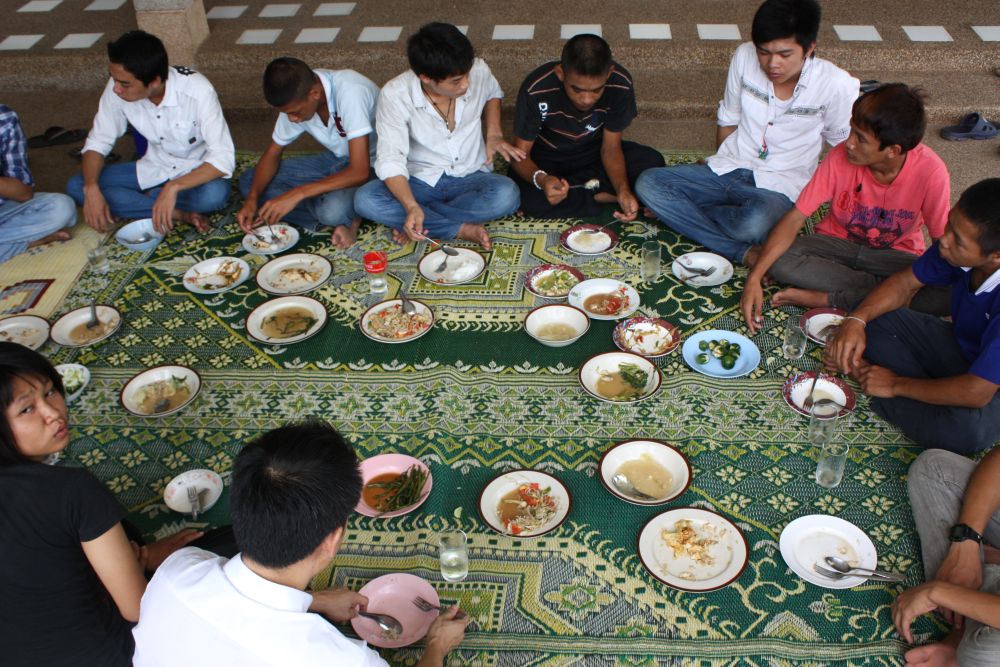
The Thai people are the largest ethnic group in Thailand and make up over 80% of the population. They are believed to have migrated from southern China to the area that is now Thailand more than a thousand years ago. Over the years, the Thai people have developed a rich cultural heritage that is reflected in their customs and traditions.
Thailand is a hierarchical society, with a strong emphasis on respect for authority and social status. The concept of "face" (saving face or losing face) is important in Thai culture, and it's considered impolite to criticize or confront others in public. Thai people are generally polite, friendly, and hospitable, and they place great value on maintaining harmony in social interactions.
Family is a cornerstone of Thai society, and the extended family is often involved in decision-making and child-rearing. Elders are highly respected and are expected to be cared for by their children in their old age. Thai families also tend to be close-knit and supportive of one another.
Community is also an important aspect of Thai society, and people often identify with their region or hometown. Rural communities, in particular, have a strong sense of community and are known for their close-knit relationships.
In terms of social customs and traditions, Thai people typically greet each other with a wai, a gesture of respect that involves placing the palms together at chest level and bowing the head. Gift-giving is also an important part of Thai culture, and it's customary to bring small gifts when visiting someone's home or attending a social event.
Overall, Thai society is characterized by a strong emphasis on respect, harmony, and social cohesion. Understanding these cultural norms is key to building positive relationships with Thai people and navigating the intricacies of Thai society.
In Thailand, family takes precedence, and there is a greater emphasis placed on the extended family than in western countries. The large number of siblings a Thai person may have is often due to the inclusion of cousins, as there is no word for "cousin" in Thai, and they are referred to as brothers and sisters.
Extended families tend to reside in close proximity, and many Thais maintain strong connections to their hometowns, even if they relocate for work. It's not uncommon for children to be raised by grandparents, aunts, or uncles if their parents work elsewhere. The younger generation is expected to contribute to the care of older family members, whether financially or by performing household tasks.
Religion in Thailand
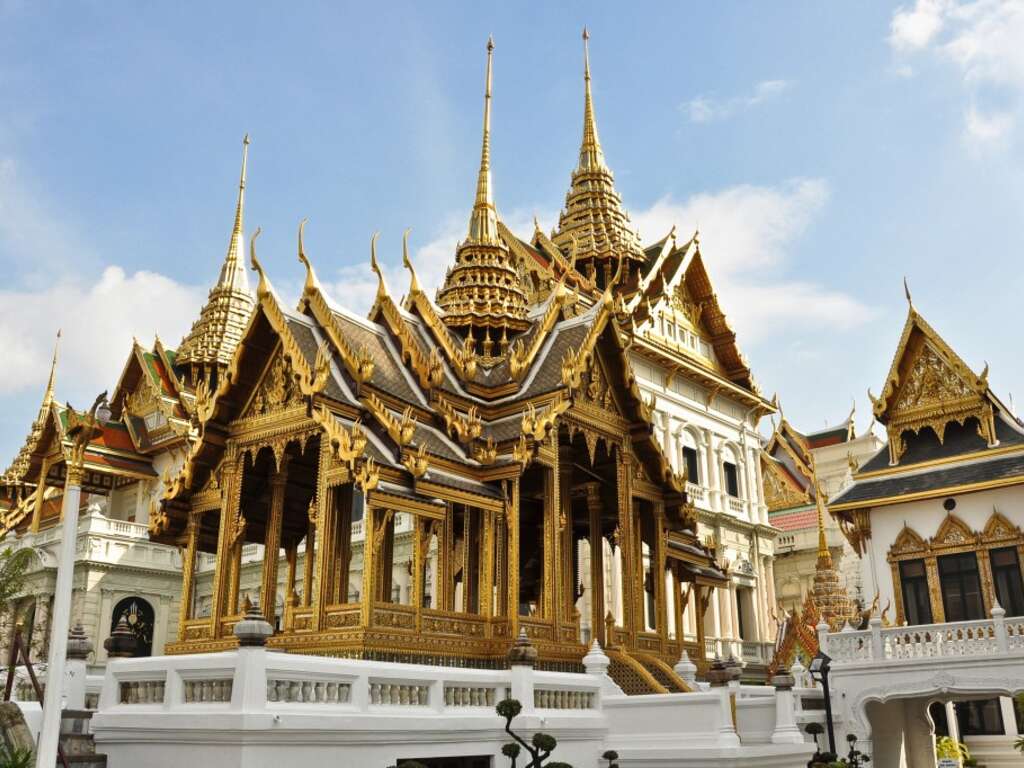
Religion is a significant aspect of Thai culture, with Buddhism being the predominant religion, practiced by over 90% of the population. The Theravada branch of Buddhism, which emphasizes personal spiritual development and meditation, is particularly prominent. Buddhism in Thailand is considered a philosophy of life, and its influence can be seen in everyday routines and practices. The Sangha, or monastic community, is an essential institution in Thailand, providing education and a way for laypeople to accrue good karma.
Aside from Buddhism, other religions are also present in Thailand, such as Islam, Christianity, Sikhism, and Hinduism. While over 93% of the Thai population practices Buddhism, the country recognizes and respects other religions. Muslims, who are mostly of Malay origin, reside mainly in southern Thailand, while Christians and Hindus make up smaller portions of the population.
Incorporating elements of Animism and Hinduism, Buddhism in Thailand displays unique features such as the widespread use of spirit houses and other religious practices. Many homes and public buildings feature a "spirit house" or "san phra phum," which is a small shrine where people can leave offerings to honor the spirits believed to dwell in the land.
Thai Buddhist monks, or "bhikkhus," are highly respected and play a crucial role in the community. They live in monasteries, or "wat," and follow strict rules regarding their clothing, behavior, and diet. It is common for Thai men to spend some time living as a monk, particularly before getting married or pursuing a career.
Religious customs and traditions are evident in various aspects of daily life in Thailand, from traditional architecture to cultural events and festivals. There are many religious festivals and ceremonies throughout the year, which often involve elaborate processions, music, and dancing. Some of the most famous include Songkran, the Thai New Year, and Loy Krathong, the Festival of Lights, which feature floating lanterns and offerings on waterways throughout the country.
Overall, religion is an essential component of Thai culture, shaping the country's customs and traditions, and providing a deep sense of meaning and purpose to the lives of many Thais. The diverse religious landscape in Thailand reflects the country's rich history and cultural heritage, and its people's openness and respect towards various faiths.
| Religion | Census 2010 | Census 2015 | Census 2018 | |||
|---|---|---|---|---|---|---|
| Population | % | Population | % | Population | % | |
| Buddhism | 61,746,429 | 93.58% | 63,620,298 | 94.50% | 63,299,192 | 93.46% |
| Islam | 3,259,340 | 4.94% | 2,892,311 | 4.29% | 3,639,233 | 5.37% |
| Christianity | 789,376 | 1.20% | 787,589 | 1.17% | 767,624 | 1.13% |
| Hinduism | 41,808 | 0.06% | 22,110 | 0.03% | 12,195 | 0.018% |
| Sikhism | 11,124 | 0.02% | 716 | 0.001% | ||
| Confucianism | 16,718 | 0.02% | 1,030 | 0.001% | 2,009 | 0.002% |
| Other religions | 70,742 | 0.11% | 1,583 | 0.002% | ||
| Not religious | 46,122 | 0.07% | 2,925 | 0.005% | 2,082 | 0.003% |
| Unknown | 3,820 | 0.005% | - | - | 4,085 | 0.006% |
| Total | 65,981,660 | 100% | 67,228,562 | 100% | 67,726,419 | 100% |
The Influence of Buddhism and Hinduism on Thai Culture
Buddhism and Hinduism are the two major religions in Thailand, and they have had a profound influence on Thai culture.
- Buddhism is the dominant religion in Thailand, with over 95% of the population identifying as Buddhist. Buddhism teaches the importance of non-violence, compassion, and wisdom. These values are reflected in many aspects of Thai culture, such as the emphasis on politeness and respect for elders. Buddhism also plays a central role in Thai festivals and ceremonies.
- Hinduism has had a significant influence on Thai culture, even though it is not the majority religion. Many Hindu deities and symbols are found in Thai art, architecture, and literature. The Thai national epic, the Ramakien, is based on the Hindu epic the Ramayana. Hindu beliefs about karma and reincarnation are also found in Thai folk religion.
Here are some specific examples of the influence of Buddhism and Hinduism on Thai culture:
- Art and architecture: Thai art and architecture is heavily influenced by both Buddhism and Hinduism. Many Thai temples are decorated with images of Buddha, Hindu deities, and other religious motifs. The Wat Pho temple in Bangkok is home to a giant reclining Buddha statue, and the Wat Arun temple is known for its intricate mosaics.
- Festivals: Many Thai festivals are influenced by Buddhism and Hinduism. The Songkran festival, which is celebrated in April, is a water festival that marks the beginning of the Thai New Year. The Loy Krathong festival, which is celebrated in November, is a festival of lights that honors the water spirits.
- Beliefs and practices: Thai beliefs and practices are also influenced by Buddhism and Hinduism. For example, many Thai people believe in karma and reincarnation. They also believe in the importance of merit-making, which is the act of doing good deeds in order to improve one's karma.
- Religion: Buddhism was born in ancient India in the 6th century BC before spreading across much of Asia. Today, over 95% of Thailand's population practice Theravada Buddhism, which has become integrated with folk religion and Chinese religions. Buddhism is also evident in the architecture and art of Thailand, with more than 40,000 temples across the country. Hinduism has also made important contributions to Thai culture, especially in the fields of literature, dance, and drama. The Ramakien, the national epic of Thailand, is based on the Hindu Ramayana of India. Hindu-Buddhist deities are worshiped by many Thais, such as Brahma, Ganesh, Indra, and Shiva.
- Ceremonies: Many of the ceremonies that are important to Thai culture have been adopted from Indian traditions, including ceremonies of marriage, ordination, merit making, and cremation. Thai culture's biggest inspiration comes from the Lord Buddha but is also influenced by Hindu deities and Hindu ceremonial rites, particularly those concerned with royal ceremonies. The monarchy and the royal family play a significant role in Thai culture and politics. The king is revered as the head of state and the protector of religion and the people. The royal family is involved in many social and charitable projects, as well as promoting Thai culture and heritage.
- Food: Although Thailand has its own unique cuisine which is comprised of sweet, sour, bitter, salty, and spicy flavours, it has evolved from Indian and Chinese influences. The influences of foreign trade played a vital role and it is believed that Buddhist monks from India originally brought the curry to Thailand. The most popular curries today are the masaman curry which contains dried spices, including cinnamon and nutmeg, and yellow curry which is infused with turmeric, cumin, ground coriander seed and chili powder.
- Language: The Thai language was created by King Ramkhamhaeng the Great by modelling it on ancient Indian Sanskrit and Pali alphabets. The Thai language was also strongly influenced by Khmer, Malay, English, and Chinese. After developing over the past 700 years, the Thai alphabet consists today of 44 characters. Thai is a tonal language, saying the same word in a different tone has a different meaning.
- Literature and Dance: The Thai national epic, the Ramakien, is based on the Hindu epic the Ramayana. The Ramakien tells the story of Rama, a prince who is exiled from his kingdom and must fight to reclaim his throne. The story is full of adventure, romance, and moral lessons.Traditional Thai literature and drama have been heavily influenced by the arts and legends of India. Historically Thai literature was only concerned with a few subjects; with religion, royalty and aristocracy, before a shift where prose became one of the preferred forms of writing. The Ramakien is one of the most important Thai literary pieces which was derived from the Hindu epic Ramayana of India. Both the 'Khon' and 'Lakhon' classical Thai dances also draw inspiration from the Ramakien.
As you can see, Buddhism and Hinduism have had a profound influence on Thai culture. These religions have shaped the way Thai people think, act, and celebrate.
Buddhism in Thai Culture
Buddhism is a major influence on Thai culture, as it is the official religion of the country and practiced by more than 95% of the population. Buddhism in Thailand is mainly of the Theravada school, which emphasizes the teachings of the historical Buddha and the attainment of enlightenment. Buddhism in Thailand has also incorporated elements of folk religion, Chinese religions, and Hinduism over the centuries. Here are some of the ways that Buddhism shapes Thai culture:
- Temples: Thailand is home to over 40,000 Buddhist temples, which are known as wats. They are the centers of religious and social life for many Thais, who visit them regularly to pray, make merit, meditate, receive blessings, and participate in festivals. Temples are also places of learning, where monks teach the Buddhist scriptures and moral precepts. Temples are also architectural and artistic marvels, with elaborate designs, statues, paintings, and stupas that reflect the Buddhist cosmology and history.
- Monks: There are about 300,000 monks in Thailand, who are highly respected and revered by the lay people. Monks follow a strict code of conduct, which includes celibacy, poverty, and non-violence. They also practice meditation and study the Buddhist texts. Monks depend on the donations of food and other necessities from the lay people, who in turn receive merit and spiritual guidance from them. Every Thai male is expected to ordain as a monk for a period of time in his life, usually before he turns 20. This is seen as a way of repaying one's parents for their kindness and gaining moral and spiritual maturity.
- Ceremonies: Many of the ceremonies that are important to Thai culture have been influenced by Buddhism, such as weddings, funerals, ordinations, merit-making, and festivals. Some of the most famous Buddhist festivals in Thailand are Songkran (the Thai New Year), Loy Krathong (the festival of lights), Vesak (the celebration of Buddha's birth, enlightenment, and death), Asalha Puja (the commemoration of Buddha's first sermon), and Uposatha (the observance days). These ceremonies often involve rituals such as offering flowers, incense, candles, food, and water to the Buddha images or monks; chanting prayers and sutras; listening to sermons; giving alms; releasing animals; and performing acts of generosity and kindness.
- Values: Buddhism also influences the values and attitudes of Thai people, such as respect for elders, gratitude for parents, compassion for all living beings, generosity for the needy, humility for oneself, tolerance for diversity, harmony for society, and detachment from worldly pleasures. Buddhism also teaches the concepts of karma (the law of cause and effect), rebirth (the cycle of birth and death), samsara (the realm of suffering), nirvana (the state of liberation), anatta (the doctrine of no-self), anicca (the impermanence of all phenomena), and dukkha (the unsatisfactoriness of existence). These concepts help Thais understand their place in the world and cope with the challenges and uncertainties of life.
Hinduism in Thai Culture
One of the most prominent influences on Thai culture is Hinduism, which arrived in Thailand between the 6th and 12th centuries CE, along with the expansion of the Khmer Empire from present-day Cambodia. Hinduism is one of the oldest religions in the world, originating from ancient India. It is a complex and diverse system of beliefs, practices, and traditions that worship a multitude of gods and goddesses, such as Brahma, Vishnu, Shiva, Ganesha, Lakshmi, and Saraswati.
Although Thailand is predominantly a Buddhist country today, with over 95% of the population following Theravada Buddhism, Hinduism has left a lasting impact on many aspects of Thai culture, such as art, architecture, literature, language, ceremonies, and values. Here are some of the ways that Hinduism has shaped Thai culture over the centuries:
- Art and Architecture: Thailand is home to many stunning temples, palaces, monuments, and sculptures that reflect Hindu influences. For instance, the Grand Palace in Bangkok features statues of Hindu giants (yakshas) guarding the gates. The Phanom Rung temple in Buriram province is a Khmer-style temple dedicated to Shiva, the god of destruction and regeneration. The temple is built to represent Mount Kailash, the sacred mountain of Hinduism. The temple also features reliefs and statues of other Hindu deities, such as Ganesha, Vishnu, Brahma, and Durga. Another example of Hindu-inspired architecture is the Erawan Shrine in Bangkok, which houses a four-faced statue of Brahma (Phra Phrom), the god of creation. The shrine is a popular destination for both locals and tourists who seek blessings and make offerings to the god.
- Literature and Drama: Thailand's national epic, Ramakien, is based on the Hindu epic Ramayana, which tells the story of Rama, an incarnation of Vishnu, who rescues his wife Sita from the demon king Ravana. The Ramakien was adapted by Thai kings and poets to suit the local culture and context. The Ramakien is also the main source of inspiration for classical Thai dance and drama forms, such as khon and lakhon. These forms use elaborate costumes, masks, gestures, and music to portray the characters and events of the epic. The Ramakien is also depicted in mural paintings that adorn many temples in Thailand.
- Language: The Thai language was influenced by Sanskrit and Pali, two ancient languages of India that are used in Hindu scriptures and Buddhist texts. Many Thai words have Sanskrit or Pali roots or are borrowed directly from these languages. For example, the word for king in Thai is raja (from Sanskrit raja), the word for teacher is ajan (from Pali acariya), and the word for elephant is chang (from Sanskrit gaja). Some Thai names are also derived from Sanskrit or Pali names of Hindu gods or characters. For example, Narai (from Vishnu), Isuan (from Shiva), In (from Indra), and Phikanet (from Ganesha).
- Ceremonies: Many Thai ceremonies have been influenced by Hindu rituals and traditions. For example, weddings in Thailand often involve the exchange of garlands (malai) between the bride and groom, which is a symbol of love and respect in Hindu culture. Another ceremony that has Hindu origins is the ordination of Buddhist monks (buddhasikkha), which involves shaving the head and eyebrows of the novice monk as a sign of renunciation. This practice was adopted from the Hindu custom of tonsure (mundana), which is performed as a rite of passage or purification. Furthermore, some Thai festivals have Hindu elements or are derived from Hindu festivals. For example, Songkran , the Thai New Year festival celebrated in April , involves splashing water on each other as a way of cleansing and blessing. This festival is similar to Holi , the festival of colors celebrated by Hindus in March .
- Values: Hinduism also influences some of the values and attitudes of Thai people. For instance, respect for elders , gratitude for parents , compassion for all living beings , generosity for the needy , humility for oneself , tolerance for diversity , harmony for society , and detachment from worldly pleasures are some of the values that are shared by both Hinduism and Buddhism. Moreover, some concepts that are central to Hindu philosophy , such as karma (the law of cause and effect), rebirth (the cycle of life and death), samsara (the realm of suffering), nirvana (the state of liberation), anatta (the doctrine of no-self), anicca (the impermanence of all things), and dukkha (the dissatisfaction or suffering that arises from attachment) are also adopted by Buddhism and influence the worldview of Thai people.
Literature in Thai Culture
Literature is an important aspect of Thai culture, as it reflects the history, values, and identity of the Thai people. Thai literature has been influenced by various sources, such as Indian, Chinese, and Western cultures, as well as indigenous beliefs and traditions. Thai literature can be divided into four main periods: Sukhothai, Ayutthaya, Thon Buri, and Rattanakosin.
Sukhothai Literature (1238-1377)
The Sukhothai period is considered the first golden age of Thai literature, as it witnessed the emergence of a distinctive Thai language and script. The literature of this period was mainly written in stone inscriptions, which provide vivid accounts of the contemporary life, politics, and religion. The most famous of these is the Ramkhamhaeng inscription of 1292, in which King Ramkhamhaeng records the economic abundance of his kingdom and the benevolence of his rule.
The Sukhothai period also produced some of the earliest examples of poetry in Thai, such as rai (rhymed verses), khlong (couplets), and kap (quatrains). Some of these poems were based on indigenous stories, such as Thao Hung Thao Cheuang, a shared epic story about a noble warrior of a Khom race in mainland Southeast Asia.
Ayutthaya Literature (1350-1767)
The Ayutthaya period was the second golden age of Thai literature, as it saw the development of various literary genres and styles. The literature of this period was influenced by Indian culture, especially Buddhism and Hinduism. The Ayutthaya period produced many religious works, such as Maha chat (The Great Birth), the Thai version of the Vessantara jataka, which recounts the story of the future Buddha's penultimate life on earth; Lilit phra Lo (The Story of Prince Lo), a tragic romance based on the legend of Prince Vessantara's previous life; and Lilit Yuan phai (The Defeat of the Yuan), a historical work celebrating Ayutthaya's defeat of the forces of the northern Lan Na kingdom. The Ayutthaya period also introduced new poetic forms, such as nirat (poems describing journeys or separations), chan (poems using Sanskrit meters), and khlong si suphap (poems using a complex rhyme scheme). Some of the most highly regarded nirat poems date from this period, such as Si Prat's Nirat khlong kamsuan (A Mournful Journey), describing his journey into exile in Nakhon Sri Thammarat.
Thon Buri Literature (1767-1782)
The Thon Buri period was a short but significant period in Thai literature, as it marked the restoration of Thai sovereignty after the fall of Ayutthaya to the Burmese invaders in 1767. The literature of this period was mainly concerned with rebuilding the nation and reviving the culture. Many law codes, religious works, and literary texts were rewritten or recovered from the ruins of Ayutthaya. One of the most notable works of this period is the Ramakian, a Thai version of the Indian Ramayana, which was composed during the reign of King Rama I (1782-1809). The Ramakian is considered the national epic of Thailand, as it depicts the heroism and morality of Rama and his allies against the evil Ravana.
Rattanakosin Literature (1782-present)
The Rattanakosin period is the current era of Thai literature, which began with the establishment of Bangkok as the new capital of Thailand by King Rama I. The literature of this period is characterized by its grandeur and diversity, incorporating elements from various sources such as Sri Lanka, China, Persia, Europe, and neighboring kingdoms. The Rattanakosin period features many elaborate temple complexes with gilded spires, chedis, ubosots, wihans, mondops, prasats, ho trais, bai semas, and Buddha images in various postures and materials. The Rattanakosin period also introduces new forms of art such as mural paintings, lacquerware, nielloware, and royal barges.
Some of the most splendid examples of Rattanakosin art can be seen at Wat Phra Kaew, Wat Arun, and Wat Pho in Bangkok. The Rattanakosin period also produced many literary works in various genres and styles. Some of these include Khun Chang Khun Phaen, an epic poem full of martial and amatory exploits; Phra Aphaimani, a fantasy adventure named after its hero; Nang Tanee, a folk tale about a female ghost; Inao, a romance based on a Javanese legend; Si Phaendin, a historical novel about the four regions of Thailand; and Khwam Mai Phayabat, a political satire about corruption and dictatorship.
Literature in Thai culture is not only a reflection of beauty and aesthetics, but also a manifestation of the Thai people's faith and values. Literature in Thai culture also contributes to the country's social and economic development, as it attracts tourists, generates income, preserves traditions, and promotes innovation. Literature in Thai culture is not static or stagnant, but rather dynamic and evolving, as it responds to changing times and contexts. Literature in Thai culture is a source of pride and joy for the Thai people, as well as a gift and a challenge for the world.
Art and Architecture in Thai Culture
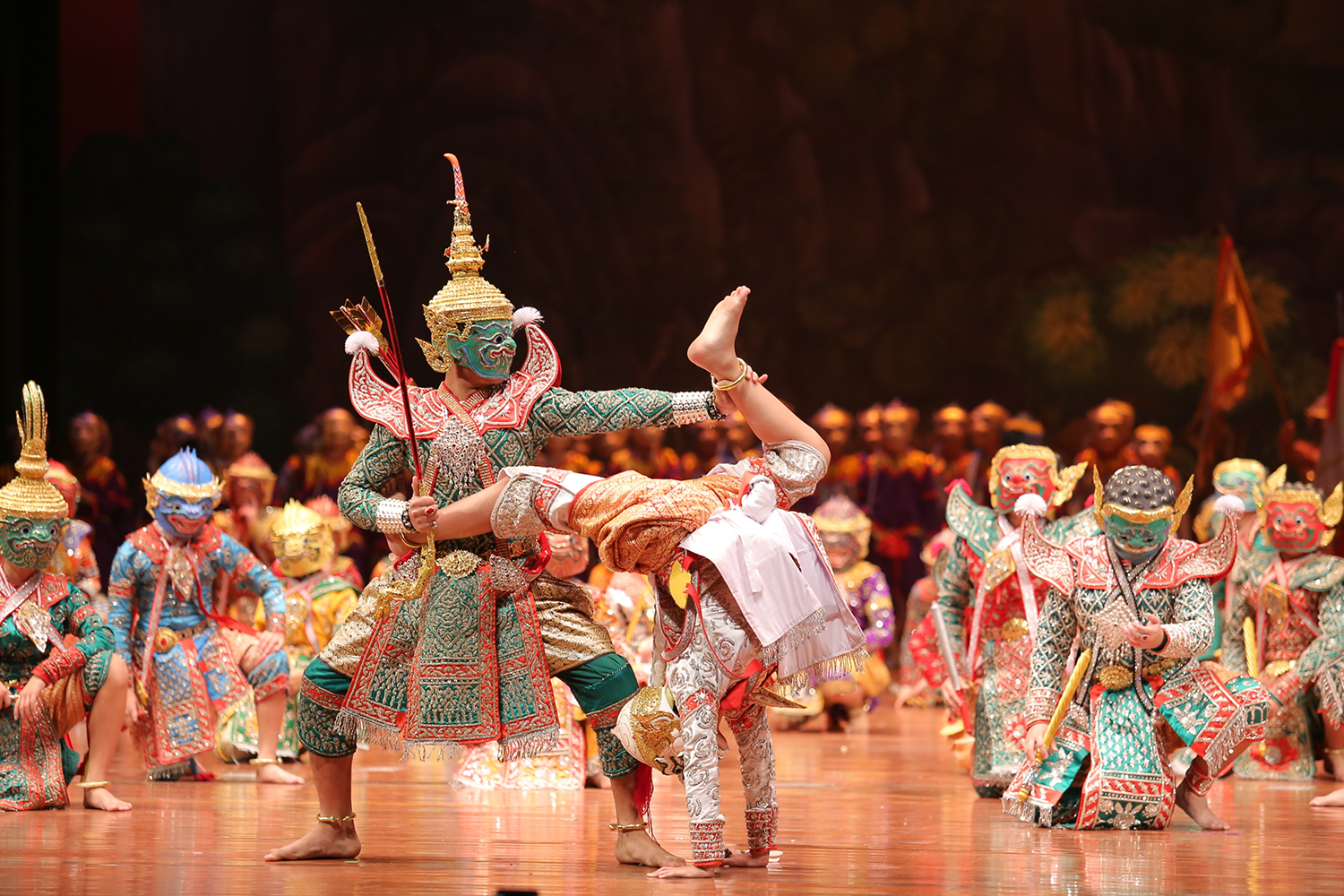
Thailand is a country rich in culture and history, with a diverse and vibrant artistic heritage that reflects its unique identity and values. Art and architecture in Thailand have been influenced by various sources, such as Buddhism, Hinduism, indigenous beliefs, and neighboring civilizations, resulting in a distinctive style that is both elegant and expressive. In this article, we will explore some of the main features and examples of art and architecture in Thai culture, from ancient times to the present day.
One of the earliest forms of artistic expression in Thailand is rock art, which can be found in over 410 documented sites across the country. These sites feature monochrome red pictograms that depict animals, humans, geometric shapes, and handprints, dating back to 3,000–5,000 years ago. Some of the most notable rock art sites are Pha Taem National Park in Ubon Ratchathani province, Tham Phraya Nakhon Cave in Prachuap Khiri Khan province, and Khao Pla Ra in Uthai Thani province.
The Dvaravati period (6th–12th centuries CE) marked the spread of Theravada Buddhism throughout Thailand, which had a significant impact on the development of art and architecture. The Dvaravati style is characterized by circular or oval stupas (relic mounds), stone Buddha images with oval faces and curly hair, terracotta votive tablets, and decorative motifs such as lotus flowers, naga serpents, and makara sea creatures. Some of the best examples of Dvaravati art can be seen at Wat Phra Men in Nakhon Pathom province, Wat Phra Si Rattana Mahathat in Lopburi province, and Wat Ku Kut in Lamphun province.
The Angkor period (11th–13th centuries CE) saw the influence of the Khmer Empire on Thai art and architecture, especially in the northeastern and central regions. The Angkor style is known for its elaborate temple complexes with towering prangs (spires), carved bas-reliefs depicting scenes from Hindu epics and Buddhist legends, and colossal stone statues of gods and guardians. Some of the most impressive examples of Angkor art can be found at Phimai Historical Park in Nakhon Ratchasima province, Phanom Rung Historical Park in Buriram province, and Lopburi Historical Park in Lopburi province.
The Sukhothai period (13th–14th centuries CE) witnessed the emergence of a distinct Thai identity and artistic expression, as the Sukhothai Kingdom became independent from the Khmer Empire and established its own cultural and political center. The Sukhothai style is renowned for its graceful and refined Buddha images with slender bodies, elongated limbs, flame-like ushnishas (cranial protuberances), and serene smiles. The Sukhothai style also introduced the lotus-bud chedi (stupa), a conical structure with a pointed top resembling a lotus bud. Some of the most exquisite examples of Sukhothai art can be seen at Sukhothai Historical Park in Sukhothai province, Si Satchanalai Historical Park in Sukhothai province, and Wat Si Chum in Sukhothai province.
The Ayutthaya period (14th–18th centuries CE) was a golden age of Thai art and architecture, as the Ayutthaya Kingdom became a powerful and prosperous empire that dominated Southeast Asia for over four centuries. The Ayutthaya style is characterized by its grandeur and diversity, incorporating elements from various sources such as Sri Lanka, India, China, Persia, Europe, and neighboring kingdoms. The Ayutthaya style features massive temple complexes with prangs (spires), chedis (stupas), ubosots (ordination halls), wihans (assembly halls), mondops (square pavilions), prasats (palaces), ho trais (libraries), bai semas (boundary stones), and Buddha images in various postures and materials. Some of the most magnificent examples of Ayutthaya art can be seen at Ayutthaya Historical Park in Ayutthaya province, Wat Phra Si Sanphet in Ayutthaya province, and Wat Phra Mahathat in Ayutthaya province.
The Rattanakosin period (18th century CE–present) is the current era of Thai art and architecture, which began with the establishment of Bangkok as the new capital of Thailand by King Rama I after the fall of Ayutthaya to the Burmese invaders. The Rattanakosin style is influenced by the Ayutthaya style but also incorporates new elements from Western culture and technology. The Rattanakosin style features elaborate temple complexes with gilded prangs (spires), chedis (stupas), ubosots (ordination halls), wihans (assembly halls), mondops (square pavilions), prasats (palaces), ho trais (libraries), bai semas (boundary stones), and Buddha images in various postures and materials. The Rattanakosin style also introduces new forms of art such as mural paintings, lacquerware, nielloware, and royal barges. Some of the most splendid examples of Rattanakosin art can be seen at Wat Phra Kaew in Bangkok, Wat Arun in Bangkok, and Wat Pho in Bangkok.
Traditional Thai houses are another important aspect of Thai art and architecture, which reflect the adaptation of the Thai people to their natural environment and social context. Traditional Thai houses are usually built on stilts to protect from floods and animals, and have a steep roof to facilitate drainage and ventilation. Traditional Thai houses are made of wood, bamboo, or thatch, and have a simple layout with a central living area, a kitchen, a bathroom, and a veranda. Traditional Thai houses are decorated with carvings, paintings, textiles, and handicrafts that showcase the skills and creativity of the Thai people. Some of the most charming examples of traditional Thai houses can be seen at Jim Thompson House in Bangkok, Ban Chiang National Museum in Udon Thani province, and Ban Rai Kong Khing Community in Chiang Mai province.
Art and architecture in Thailand are not only expressions of beauty and aesthetics, but also manifestations of the Thai people's faith and values. Religious buildings such as temples, shrines, and spirit houses are ubiquitous in Thailand, and serve as places of worship, meditation, education, and community. Religious buildings in Thailand are often adorned with symbols and motifs that represent Buddhist teachings, cosmology, mythology, and folklore. Some of the most common symbols and motifs are the lotus flower (purity), the naga serpent (protection), the garuda bird (power), the makara sea creature (wealth), the lion (courage), the elephant (royalty), the monkey (wisdom), and the swan (grace). Some of the most sacred and revered religious buildings in Thailand are Wat Phra That Doi Suthep in Chiang Mai province, Wat Phra That Phanom in Nakhon Phanom province, and Wat Phra That Lampang Luang in Lampang province.
Art and architecture in Thailand are also reflections of the Thai people's culture and lifestyle. Sala Thai (Thai pavilions) are open-air structures that provide shade and shelter for various purposes such as resting, meeting, eating, studying, or performing. Sala Thai are usually built near water sources such as rivers, canals, ponds, or wells, and have a roof supported by pillars and a floor raised above the ground. Sala Thai are decorated with carvings, paintings, or sculptures that depict scenes from Thai literature, history, or nature. Some of the most beautiful examples of Sala Thai can be seen at Vimanmek Mansion in Bangkok, Sala Rim Naam Restaurant in Bangkok, and Sala Keoku Sculpture Park in Nong Khai province.
Community places such as markets, schools, museums, theaters, and stadiums are also important venues for art and architecture in Thailand. Community places are designed to facilitate social interaction, cultural exchange, education, entertainment, and recreation. Community places in Thailand often incorporate elements of traditional Thai architecture such as roofs, pillars, windows, doors, and ornaments. Community places in Thailand also display various forms of art such as paintings, sculptures, photographs, posters, and graffiti that convey messages, stories, emotions, or opinions. Some of the most lively and colorful examples of community places in Thailand are Chatuchak Weekend Market in Bangkok, Siam Niramit Cultural Show in Bangkok, and Rajadamnern Stadium in Bangkok.
Art and architecture in Thailand are not only products of the past but also sources of inspiration for the present and the future. Contemporary Thai art is a dynamic and diverse field that explores various themes such as identity, politics, religion, society, environment, and technology. Contemporary Thai art employs various media such as painting, sculpture, installation, performance, video, and digital art to express ideas, critiques, or visions. Contemporary Thai art also engages with local and global audiences through exhibitions, festivals, workshops, and collaborations. Some of the most prominent and influential contemporary Thai artists are Thawan Duchanee, Chalermchai Kositpipat, Montien Boonma, Rirkrit Tiravanija, Navin Rawanchaikul, Apichatpong Weerasethakul, and Araya Rasdjarmrearnsook.
Art and architecture in Thailand are integral parts of the country's cultural heritage and national identity. They showcase the creativity and diversity of the Thai people, as well as their values and beliefs. Art and architecture in Thailand also contribute to the country's social and economic development, as they attract tourists, generate income, preserve traditions, and promote innovation. Art and architecture in Thailand are not static or stagnant, but rather dynamic and evolving, as they respond to changing times and contexts. Art and architecture in Thailand are a source of pride and joy for the Thai people, as well as a gift and a challenge for the world.
Food and Cuisine
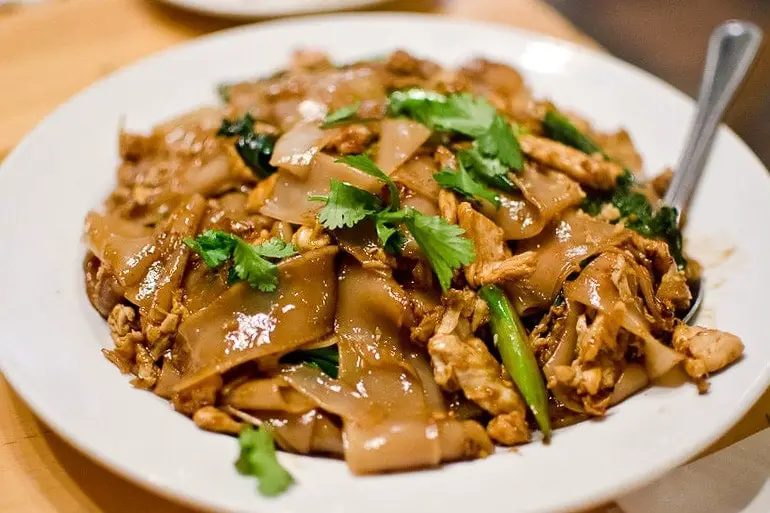
Thai cuisine is an essential part of Thai culture and identity. The country's diverse culinary heritage reflects its unique blend of cultures, geography, and history. From spicy curries to sweet and savory desserts, Thai food is renowned for its complex flavors and aromatic herbs and spices. The most common flavors in Thai cuisine are sweet, sour, salty, bitter, and spicy, which are often combined in a single dish to create a harmonious balance of flavors. Some of the key ingredients in Thai cooking include lemongrass, chili peppers, galangal, coconut milk, fish sauce, and palm sugar. However, there are also many regional variations in Thai cuisine, depending on the availability of local ingredients and the influence of neighboring countries.
Thai cuisine is known for its diverse range of dishes, which can vary from region to region. Some of the most popular Thai dishes include appetizers and soups such as spring rolls, tom yum, and tom kha gai, as well as salads and curries such as som tam, green curry, and massaman curry. Main dishes like pad Thai, stir-fried basil chicken, and pad kra pao are also widely enjoyed. In addition, Thai street food is a must-try for any visitor to Thailand, with favorites including mango sticky rice, banana pancakes, and satay.
If you want to discover the best foods to try in Thailand, click here to read our mouth-watering guide.
Thai cooking techniques and tools are also an important aspect of Thai cuisine. The most common cooking techniques are stir-frying, deep-frying, and grilling, which are used to create dishes with intense flavors and textures. Thai cooks often use woks and mortar and pestle to prepare ingredients and create a distinctive taste and aroma. The freshness and seasonality of ingredients are also important considerations in Thai cooking, with many dishes featuring herbs and spices that are locally grown and harvested.
Thai dining customs and etiquette are also an important part of Thai culture. In Thai culture, food is typically served family-style and shared among diners, with everyone using utensils and chopsticks to eat. Thai table manners and customs include a polite and respectful approach to dining, such as not using chopsticks to point or leaving food on your plate as a sign of respect to the host.
Thai cuisine is not only influenced by geography and history but also by religion and culture. For example, Chinese and Indian influences have had a significant impact on Thai cuisine, with Chinese-style noodles and Indian-style curries being popular dishes in Thailand. Royal Thai cuisine, which developed from palace cooking, is another significant aspect of Thai cuisine, featuring a range of elaborate and refined dishes that reflect the country's royal heritage. Food offerings in Thai religious ceremonies are also an essential part of Thai culture, reflecting the importance of food and its spiritual significance.
Thai food and cuisine are an essential part of Thai culture and identity. With its rich diversity of flavors, ingredients, and techniques, Thai cuisine offers a unique and unforgettable dining experience. Whether you're sampling street food in Bangkok or enjoying a royal Thai banquet, the cuisine of Thailand is sure to tantalize your taste buds and provide a glimpse into the country's fascinating history and culture.
Festivals and Celebrations
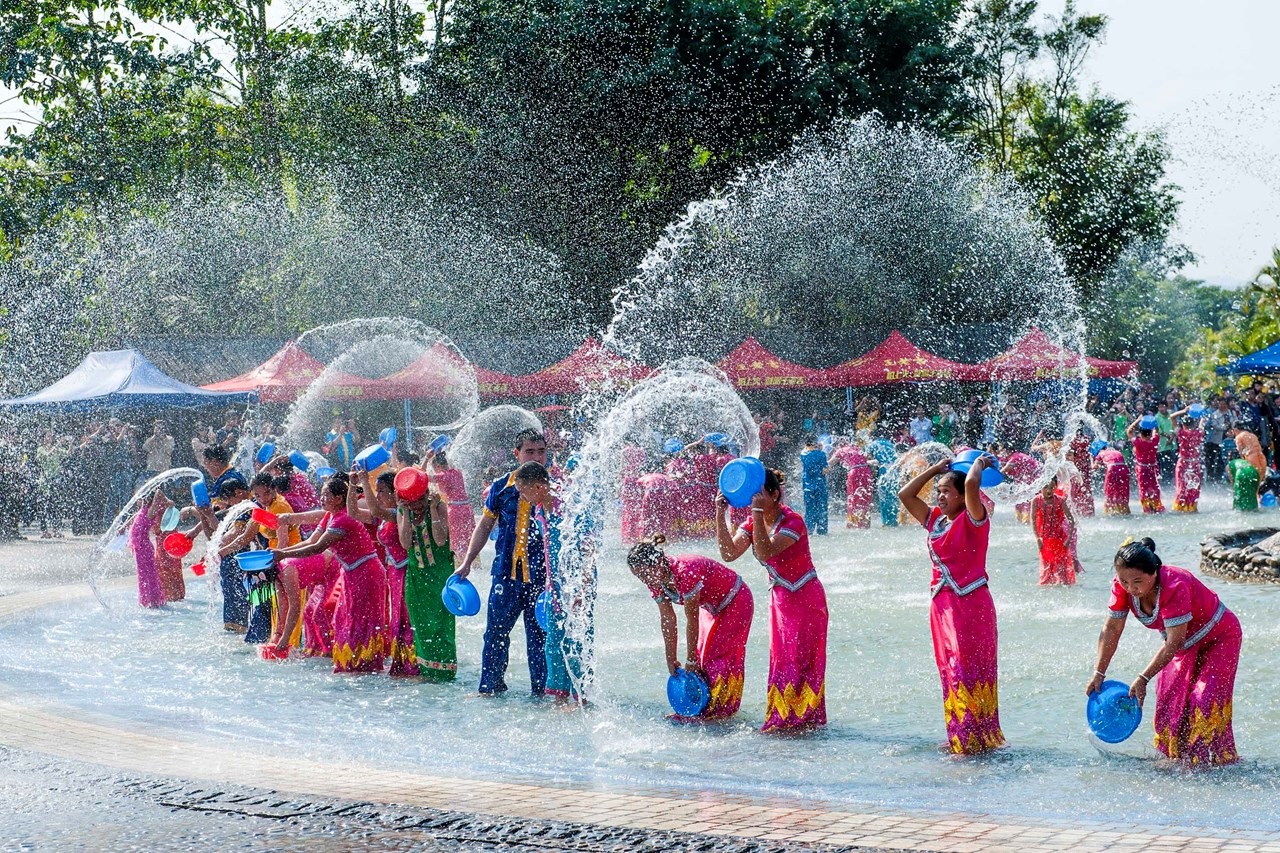
Thailand is renowned for its vibrant festivals and celebrations, which are a reflection of the country's rich cultural heritage. From the dazzling lantern displays of Loy Krathong to the frenzied water battles of Songkran, Thai festivals offer a unique and unforgettable experience.
Thailand has a diverse range of festivals and celebrations, ranging from religious ceremonies to secular events. Some of the most popular festivals include:
- Songkran: The Thai New Year, celebrated in April, is marked by a nationwide water festival, where people douse each other with water to wash away bad luck and purify the soul.
- Loy Krathong: Held in November, Loy Krathong is a festival of lights where people float small decorated baskets made of banana leaves and flowers on waterways.
- Phi Ta Khon: This is a unique and colorful festival in the northeastern province of Loei, where locals dress up in elaborate masks and costumes and parade through the streets.
Songkran is the most widely celebrated festival in Thailand, marking the traditional Thai New Year. The festival is celebrated from April 13 to 15 and is marked by a nationwide water fight. People splash water on each other with buckets, water guns, and hoses, symbolizing the washing away of the old and the ushering in of the new. In addition to the water fight, people also visit temples, make offerings to monks, and engage in other religious activities.
Loy Krathong, also known as the Festival of Lights, is celebrated on the full moon night of the 12th lunar month, usually in November. The festival is marked by floating krathongs, or small baskets made of banana leaves and flowers, on waterways. The krathongs are lit with candles and incense, creating a beautiful and serene display. Loy Krathong is a time of renewal, and people use the festival to make wishes and offer gratitude.
Other notable celebrations include the Vegetarian Festival, which involves a period of abstinence from meat and other stimulants, and the annual Boon Bang Fai Rocket Festival, where locals launch homemade rockets into the sky in hopes of bringing rain for the upcoming planting season.
Thai festivals and celebrations offer a unique glimpse into the country's rich cultural heritage. Whether it's the boisterous water fights of Songkran or the serene beauty of Loy Krathong, these events are an unforgettable experience that truly capture the essence of Thailand.
Beliefs and Practices in Thai Culture
The beliefs and practices of the Thai people reflect their values, traditions, and identity as a nation. In this article, we will explore some of the main aspects of Thai culture, such as religion, customs, superstitions, and festivals.
Religion in Thai Culture
The dominant religion in Thailand is Buddhism, which is practiced by about 94% of the population. Buddhism in Thailand belongs to the Theravada school, which emphasizes the teachings of the Buddha and the attainment of enlightenment. Buddhism is not only a religion but also a way of life for many Thais, who follow the five precepts (moral rules), observe the Buddhist holidays, and make merit (good deeds) by donating to temples, monks, and charities.
Buddhism in Thailand is also influenced by other belief systems, such as Animism, Brahmanism, and Hinduism. Animism is the belief in spirits that inhabit natural objects, animals, and humans. Many Thais believe in guardian spirits that protect their homes, villages, and businesses. They often build spirit houses or shrines to honor and appease these spirits. Brahmanism is the belief in angelic beings or gods that can grant wishes and blessings. Many Thais worship these deities at shrines or temples, especially Brahma, Indra, Ganesha, and Shiva. Hinduism is the source of many myths and legends that are depicted in Thai art and literature, such as the Ramakien (the Thai version of the Ramayana) and the Mahabharata.
Other religions in Thailand include Islam (5%), Christianity (1%), and Sikhism (0.1%). Islam is mainly practiced by the Malay minority in the southern provinces near the border with Malaysia. Christianity is mostly followed by ethnic groups such as the Karen, Hmong, Lahu, Lisu, and Akha in the northern and western regions. Sikhism is a minority religion among some Indian immigrants in urban areas.
Customs in Thai Culture
Thai culture is characterized by its politeness, respectfulness, and non-confrontational attitude. Thais value harmony and avoid conflict or criticism in public. They also value hierarchy and status, which are determined by factors such as age, education, occupation, wealth, and family background. Thais show respect to their elders and superiors by using honorific titles such as khun (Mr./Mrs./Ms.), ajarn (teacher), than (sir/madam), or luang (lord/lady).
One of the most distinctive customs in Thai culture is the wai, which is a gesture of greeting, farewell, gratitude, apology, or reverence. The wai consists of placing the palms together at chest level and bowing slightly. The higher the hands are raised and the lower the head is bowed, the more respect is shown. The wai is usually initiated by the younger or lower-status person to the older or higher-status person. However, there are exceptions to this rule depending on the situation and relationship.
Another important custom in Thai culture is sanuk, which means fun or enjoyment. Thais love to have fun and make any activity or situation more enjoyable. They often joke around, laugh, and smile even when facing difficulties or challenges. They also enjoy socializing with friends, family, and strangers, and sharing food, drinks, and stories. Sanuk is a way of expressing happiness and optimism in life.
Superstitions in Thai Culture
Thai culture is full of superstitions that influence many aspects of daily life. Some of these superstitions are based on ancient beliefs, folklore, or astrology, while others are derived from modern influences such as media, fashion, or celebrities.
Some of the most common superstitions in Thai culture are:
- Do not cut your hair on Wednesdays or you will have bad luck.
- Do not point at a rainbow or your finger will fall off.
- Do not whistle at night or you will attract ghosts or snakes.
- Do not step over a person or they will stop growing.
- Do not sleep with your head facing west or you will have nightmares.
- Do not break a mirror or you will have seven years of bad luck.
- Do not walk under a ladder or you will have bad luck.
- Do not eat chicken wings or you will fly away from your lover.
- Do not eat banana peels or you will slip on them.
- Do not wear black on auspicious occasions such as weddings or birthdays.
Festivals in Thai Culture
Thai culture celebrates many festivals throughout the year that showcase its diversity, creativity, and spirituality. Some of these festivals are religious, some are cultural, and some are both.
Some of the most popular festivals in Thai culture are:
- Songkran: The Thai New Year festival that takes place in mid-April. It is a time of cleansing, renewal, and joy. People splash water on each other to wash away the bad luck and sins of the past year and to wish each other good luck and happiness for the new year. They also visit temples to make merit, offer food to monks, and pay respect to Buddha images and elders.
- Loy Krathong: The festival of lights that takes place on the full moon night of the 12th lunar month (usually in November). It is a time of gratitude, forgiveness, and romance. People float krathongs (small boats made of banana leaves, flowers, candles, and incense) on rivers, lakes, or ponds to thank the water goddess and to release their worries and regrets. They also make wishes for the future and watch the fireworks and lanterns in the sky.
- Yee Peng: The lantern festival that coincides with Loy Krathong in the northern city of Chiang Mai. It is a time of beauty, peace, and illumination. People release khom loy (paper lanterns) into the air to symbolize their hopes and dreams. They also admire the spectacular sight of thousands of lanterns floating in the night sky.
- Vegetarian Festival: The festival that takes place in late September or early October, especially in Phuket and other southern provinces. It is a time of purification, abstinence, and devotion. People follow a strict vegetarian diet for nine days to cleanse their bodies and minds. They also participate in various rituals and ceremonies, such as walking on fire, piercing their cheeks, or carrying heavy objects, to show their faith and endurance.
Beliefs and practices in Thai culture are fascinating and diverse, reflecting the country's history, geography, and identity. They also offer insights into the Thai people's values, traditions, and worldview. By learning more about Thai culture, one can appreciate its uniqueness and richness, as well as its similarities and differences with other cultures.
Conclusion
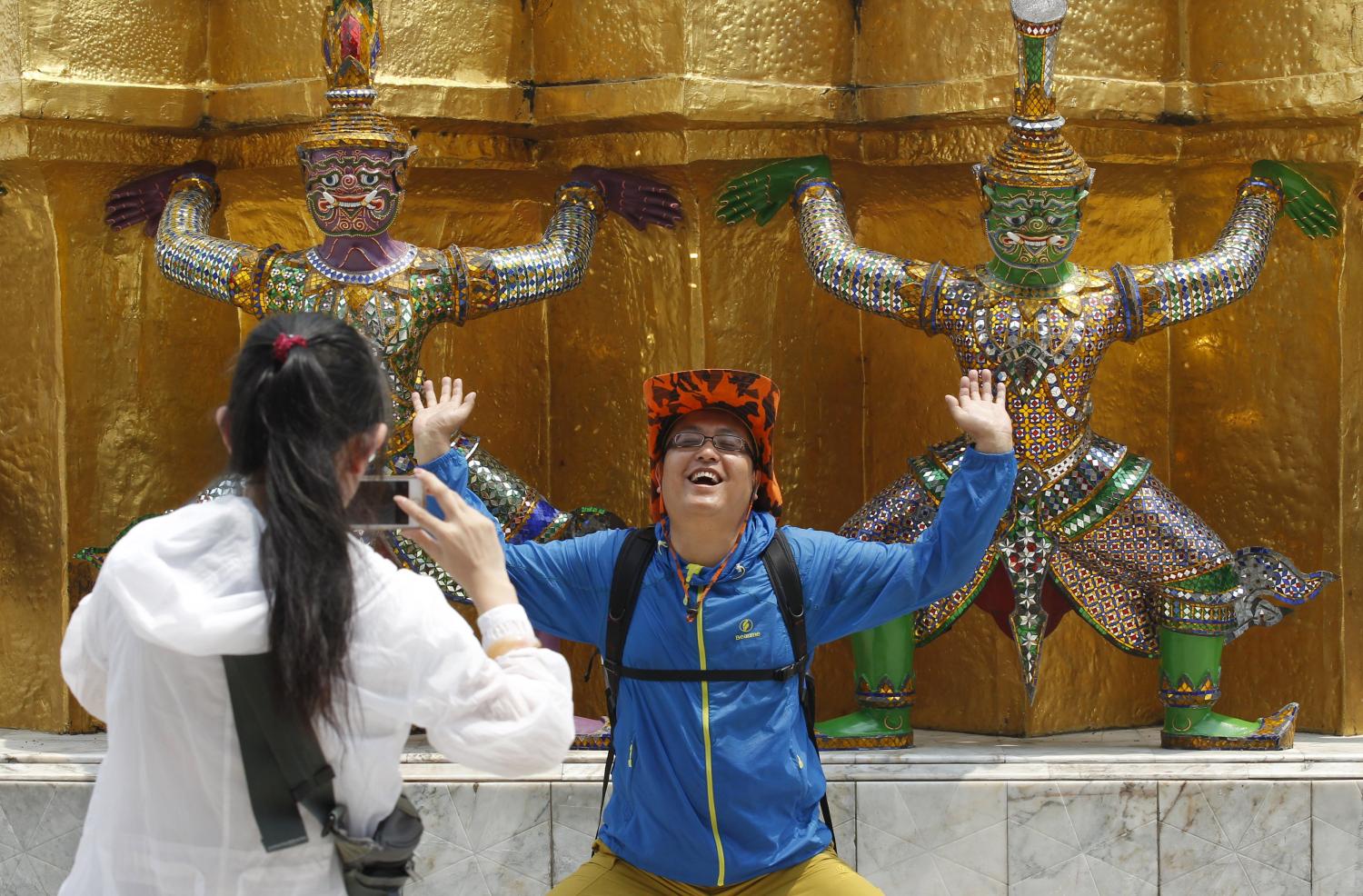
Thailand is a country with a unique and vibrant culture that has evolved over centuries. Its culture is influenced by religion, art, language, food, and festivals, and has a distinct identity that sets it apart from other countries in the region. Thai culture is not only fascinating but also deeply significant, as it reflects the values, beliefs, and customs of the Thai people. Therefore, it is crucial to preserve and promote Thai culture for future generations to appreciate and learn from.
The cultural diversity of Thailand provides a fascinating glimpse into a rich and complex society that is constantly evolving. The country's festivals and celebrations are an integral part of Thai culture, and a great way to experience it firsthand. From the colorful Songkran festival to the stunning Loy Krathong ceremony, Thai festivals are a celebration of life, culture, and community.
In conclusion, to truly understand Thailand, one must immerse oneself in its rich culture. By exploring its art, religion, language, food, and festivals, one can gain a deeper appreciation for the country and its people. We hope that this article has provided you with a glimpse into the fascinating world of Thai culture, and has inspired you to learn more about this enchanting country.

